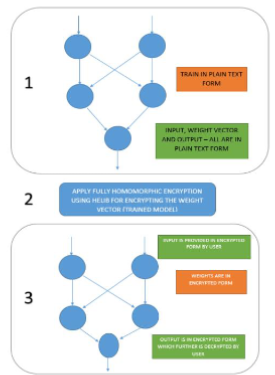Privacy Preserving Inference Over Encrypted Data
Keywords:
Privacy preserving, homomorphic encryption, secured learning, federated learningAbstract
Machine learning and deep learning techniques provide solution to various medical applications relevant to disease detection. Many a time’s these learning algorithms and their inferences are generated in untrusted environments like cloud. Medical practitioners would like to protect their data in such cases in untrusted environments but would like to generate an inference on their data. Our work provides a solution to generate privacy preserving inference over encrypted data in such untrusted environment like public cloud. HELib based fully homomorphic encryption approach is used to provide security to the trained model and the data of the owner. Our results shows the effectiveness of using the technique to generate inference on encrypted data without comprising the accuracy of the system. Our work demonstrates on benchmark datasets like MNIST for prototyping and heart disease detection that are used by many machine learning applications for benchmarking.
Downloads
References
N. Schlitter, A Protocol for Privacy Preserving Neural Network Learning on Horizontal Partitioned Data, Proc. Privacy Statistics in Databases (PSD 08), Sept. 2008
Nouby M. Ghazaly, A. H. H. . (2022). A Review of Using Natural Gas in Internal Combustion Engines. International Journal on Recent Technologies in Mechanical and Electrical Engineering, 9(2), 07–12. https://doi.org/10.17762/ijrmee.v9i2.365
T. Chen and S. Zhong,Privacy-Preserving Backpropagation Neural Network Learning, IEEE Trans. Neural Network, vol. 20, no. 10, pp. 1554-1564, Oct. 2009.
Sudhakar, C. V., & Reddy, G. U. . (2022). Land use Land cover change Assessment at Cement Industrial area using Landsat data-hybrid classification in part of YSR Kadapa District, Andhra Pradesh, India. International Journal of Intelligent Systems and Applications in Engineering, 10(1), 75–86. https://doi.org/10.18201/ijisae.2022.270
Avhankar, M. S. ., D. J. A. . Pawar, S. . Majalekar, and S. . Kedari. “Mobile Ad Hoc Network Routing Protocols – Using OPNET Simulator”. International Journal on Recent and Innovation Trends in Computing and Communication, vol. 10, no. 1, Jan. 2022, pp. 01-07, doi:10.17762/ijritcc.v10i1.5513.
Ghazaly, N. M. . (2022). Data Catalogue Approaches, Implementation and Adoption: A Study of Purpose of Data Catalogue. International Journal on Future Revolution in Computer Science &Amp; Communication Engineering, 8(1), 01–04. https://doi.org/10.17762/ijfrcsce.v8i1.2063
Nathan Dowlin, Ran Gilad-Bachrach, Kim Laine, Kristin Lauter, Michael Naehrig and John Wernsing, CryptoNets: Applying Neural Networks to Encrypted Data with High Throughput and Accuracy 29 December 2015
A generic framework for privacy preserving deep learning, Theo Ryffel, Andrew Trask, Morten Dahl, Bobby Wagner, Jason Mancuso, Daniel Rueckert, Jonathan Passerat-Palmbach, 13 Nov 2018.
Privacy Preserving Back-Propagation Neural Network Learning Made Practical with Cloud Computing. IEEE Transactions on Parallel and Distributed Systems, Vol. 25, No. 1, January 2014.
PySyft. [Online]. Available: https://github.com/OpenMined/PySyft
Sharma, V. . (2022). Unique Functors of Everywhere Connected Homomorphisms and the Countability of Groups. International Journal on Recent Trends in Life Science and Mathematics, 9(2), 01–09. https://doi.org/10.17762/ijlsm.v9i2.130
Knott, Brian and Venkataraman, Shobha and Hannun, Awni and Sengupta, Shubho and Ibrahim, Mark and van der Maaten, Laurens, CrypTen: Secure Multi-Party Computation Meets Machine Learning, https://doi.org/10.48550/arxiv.2109.00984, 2021
UCI Machine Learning Heart Disease Dataset: https://archive.ics.uci.edu/ml/datasets/heart+disease
HElib [Online]. Available: https://github.com/homenc/HElib
N. A. Libre. (2021). A Discussion Platform for Enhancing Students Interaction in the Online Education. Journal of Online Engineering Education, 12(2), 07–12. Retrieved from http://onlineengineeringeducation.com/index.php/joee/article/view/49
Li Li, Yuxi Fan, Mike Tse, Kuo-Yi Lin, A review of applications in federated learning, Computers & Industrial Engineering, Volume 149, 2020

Downloads
Published
How to Cite
Issue
Section
License

This work is licensed under a Creative Commons Attribution-ShareAlike 4.0 International License.
All papers should be submitted electronically. All submitted manuscripts must be original work that is not under submission at another journal or under consideration for publication in another form, such as a monograph or chapter of a book. Authors of submitted papers are obligated not to submit their paper for publication elsewhere until an editorial decision is rendered on their submission. Further, authors of accepted papers are prohibited from publishing the results in other publications that appear before the paper is published in the Journal unless they receive approval for doing so from the Editor-In-Chief.
IJISAE open access articles are licensed under a Creative Commons Attribution-ShareAlike 4.0 International License. This license lets the audience to give appropriate credit, provide a link to the license, and indicate if changes were made and if they remix, transform, or build upon the material, they must distribute contributions under the same license as the original.





